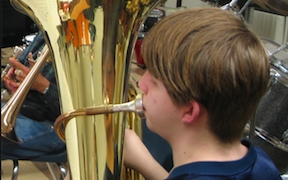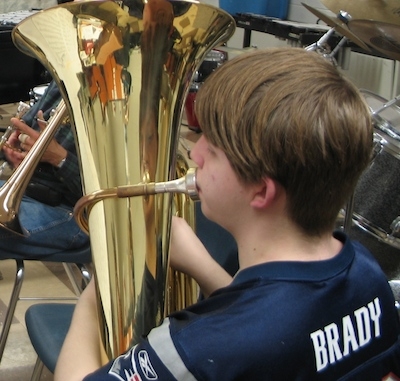Ever wonder what magpies, Russian horse-drawn sleighs, wolves, ducks, cats, bears, Czech bagpipes and Irish laundry have in common? Come to the Eastern Shore Wind Ensemble’s “What Is the Story?” concert to find out. This free concert is at Emmanuel Episcopal Church, Cross and High streets, on Sunday, March 15, 2015, at 4 p.m. The program features soloist Kent County High School sophomore Glaeden Boyd and narrator Mark Mumford, Clerk of the Kent County Circuit Court. The program includes the overture from “La Gazza Ladra,” the Troika from “Lieutenant Kije,” “Peter And The Wolf,” “The Old Grumbly Bear,” the Polka from “Schwanda, the Bagpiper,” and “The Irish Washerwoman.” It promises to be a wonderful concert for both adults and children of all ages.
Rossini’s “La Gazza Ladra” (“The Thievish Magpie”) is a classic comic opera that premiered in 1817. The plot is elaborately complicated (as was fashionable at the time), but the work sparkles with fresh touches. The main novelty was the inclusion of a pet magpie whose mischievous thievery placed others in jeopardy, but a lecherous old mayor, a falsely accused maiden, and many other characters from this opera would become stock figures in future comic operas.
“Lieutenant Kije” is based on a short story written by Vladimir Dahl in 1870. A clerk miswrites an order promoting several ensigns to second lieutenant such that a nonexistent “Ensign Kije” is promoted along with the rest. Tsar Paul (the Russian emperor) decides to promote second lieutenant Kije again, and the imaginary soldier quickly rises through the ranks, finally being promoted to colonel. Impressed, the Tsar commands that Kije appear before him, but when the military bureaucracy realizes that the whole thing has been an embarrassing clerical error, they decide to tell the Tsar that Kije has died. “What a pity,” the Tsar says, “he was a good officer.” Sergei Prokofiev wrote the score for a film adaptation of the story, and the Troika (which portrays in music a ride in an iconic Russian three-horse vehicle) is an excerpt from the film score.
In 1936, Prokofiev was commissioned by the Moscow Central Children’s Theater to write a symphony for young children. Intrigued with the idea, he completed “Peter And The Wolf” in only four days. Its inaugural performance was poorly attended and gathered little attention, but it has since become a classic young person’s piece. The story involves Peter, a young boy living with his grandfather in a forest clearing. Peter goes adventuring one day but neglects to close the garden gate, giving his grandfather’s duck the opportunity to escape and swim in a nearby pond. The duck argues with a bird, and both are stalked by the grandfather’s cat. They are warned by Peter and flee to relative safety—the bird into a tree and the duck onto the pond. Peter’s grandfather scolds Peter for being outside alone: “Suppose a wolf came out of the forest?” But Peter defies him: “Boys like me are not afraid of wolves.” His grandfather drags him back into the house, but soon a big, gray wolf does appear. The cat climbs a tree, but the duck (who has excitedly jumped out of the pond) is swallowed up. Peter fetches a rope, climbs from the garden wall to the tree, asks the bird to distract the wolf, and snares the wolf by the tail with the rope. Some hunters emerge from the forest, ready to shoot the wolf as it hangs upside down from a branch, but Peter convinces them to help him take the wolf to the zoo. They all do so in a victory parade, although the grandfather grumbles, “What if Peter hadn’t caught the wolf? What then?” At the story’s end, we learn that the duck can be heard quacking inside the wolf because in his hurry the wolf had swallowed her alive. So there is more or less a happy ending. Mark Mumford will bring this story to life with a lively narration that is interleaved with the music.
Julius Fucik composed “The Old Grumbly Bear” for solo bassoon and symphony orchestra. Glaeden Boyd will be the soloist, on tuba, in this arrangement for band. The charming and humorous music depicts the lumbering antics of a slow-moving, cranky, old bear who—at the very end—finally gathers some energy! The composer is the same Fucik who wrote hundreds of military marches, some of which have become standards—“Entry of the Gladiators,” for example, is every circus’s favorite.
“Schwanda, the Bagpiper” was a very successful opera written by Jaromir Weinberger. It was performed thousands of times in hundreds of European theaters, only to be closed down by Nazis in the 1930s. The opera, from which the Polka is an excerpt, tells a story of adventure and magic involving a queen with a heart of ice and a bagpiper who can mesmerize all with his playing. At one point he goes to Hell (which some claim all bagpipers should do) and plays for the Devil.
The contemporary composer John Williams described Leroy Anderson as “one of the great American masters of light orchestral music.” “The Irish Washerwoman” is a traditional Irish jig (a lively dance) that Leroy Anderson arranged for the Boston Pops in 1947.
Directed by Dr. Keith Wharton, the Eastern Shore Wind Ensemble is an all-ages community concert band formed to offer area wind and percussion musicians an opportunity to continue or return to the pleasures of playing quality music in a large ensemble. New members are always welcome, without audition or fee. For further information, call 410-778-2829 or 410-810-1834. The ensemble is partially supported by the Kent County Arts Council.




Write a Letter to the Editor on this Article
We encourage readers to offer their point of view on this article by submitting the following form. Editing is sometimes necessary and is done at the discretion of the editorial staff.